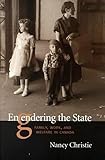Engendering The State : Family, Work, and Welfare in Canada / Nancy Christie.
Material type: TextPublisher: Toronto : University of Toronto Press, [2000]Copyright date: ©2000Description: 1 online resource (480 p.)Content type:
TextPublisher: Toronto : University of Toronto Press, [2000]Copyright date: ©2000Description: 1 online resource (480 p.)Content type: - 9780802083210
- 9781442674479
- 361.6/1/097109041
- HV108 .C474 1999eb
- online - DeGruyter
| Item type | Current library | Call number | URL | Status | Notes | Barcode | |
|---|---|---|---|---|---|---|---|
 eBook
eBook
|
Biblioteca "Angelicum" Pont. Univ. S.Tommaso d'Aquino Nuvola online | online - DeGruyter (Browse shelf(Opens below)) | Online access | Not for loan (Accesso limitato) | Accesso per gli utenti autorizzati / Access for authorized users | (dgr)9781442674479 |
Browsing Biblioteca "Angelicum" Pont. Univ. S.Tommaso d'Aquino shelves, Shelving location: Nuvola online Close shelf browser (Hides shelf browser)

|

|

|

|

|

|

|
||
| online - DeGruyter Encyclopedic Dictionary of Semiotics, Media, and Communication / | online - DeGruyter Endless Propaganda : The Advertising of Public Goods / | online - DeGruyter Enemies Within : Italian and Other Internees in Canada and Abroad / | online - DeGruyter Engendering The State : Family, Work, and Welfare in Canada / | online - DeGruyter England's Disgrace : J.S. Mill and the Irish Question / | online - DeGruyter The English Emblem Tradition / | online - DeGruyter Equal at the Creation : Sexism, Society, and Christian Thought / |
restricted access online access with authorization star
http://purl.org/coar/access_right/c_16ec
In the early part of this century the mother was the educator and moral centre of the Canadian household. Between the onset of the First World War and the development of the modern social security state in the 1940s, however, an ideological shift took place. While Canada endured the effects of two world wars, industrialization, and economic and political crises, welfare entitlements based on family reproduction were replaced by state policies that promoted paid labour in the workplace. To a nation gripped with new and great anxieties, the mother no longer appeared capable of functioning as its vitally adhesive force. The necessity of stabilizing the paternal position of the father as breadwinner in order to sustain the family and support economic progress became the progressively dominant view. Although this thinking effectively helped a portion of the population achieve economic autonomy, its damaging effects were wide reaching. Women, unskilled labourers, and the chronically indigent had been left resourceless.The author's explanation of gender's role in the conception of modern Canadian welfare policy takes current scholarship into novel territory. Her analyses of the perspectives of maternal feminists, clergymen, organized labour, businessmen, university social scientists, welfare administrators, social workers, and government policy makers are fascinating to read and contribute greatly to our understanding of the current debates in welfare policy making.
Mode of access: Internet via World Wide Web.
In English.
Description based on online resource; title from PDF title page (publisher's Web site, viewed 01. Nov 2023)


